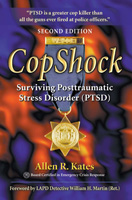
CopShock: Second Edition
Surviving Posttraumatic Stress Disorder (PTSD)
by Allen R. Kates, MFAW, BCECR
Post-Shooting Trauma (PST)
After a shooting, many officers
show symptoms of PST that may include increased alcohol use, nightmares about
malfunctioning guns, physical illness, inability to sleep or hold down food, and
periods of self-doubt, depression, anger and guilt. A common symptom is
rumination or brooding about the shooting. Even if officers do not draw or fire
their guns during a frightening confrontation, they may experience symptoms of
post-shooting trauma. Untreated, post-shooting trauma could eventually develop
into PTSD.
Police administrators may wish to consult Developing A Law
Enforcement Stress Program for Officers and Their Families (page 131) by
Peter Finn and Julie Esselman Tomz, 1997, for help in learning how to respond
appropriately to officers with these reactions. The entire 222-page book
published by the National Institute of Justice can be accessed online for free
at: http://www.ncjrs.gov/pdffiles/163175.pdf
Post-Violent Event
Trauma
Shooting expert Massad Ayoob of the Lethal Force
Institute has produced a videotape about Post-Shooting Trauma called
Post-Violent Event Trauma concerning the causes, symptoms and recovery from
post-shooting trauma. The tape states that PST is not Posttraumatic Stress
Disorder but a reaction to a single cataclysmic event or critical
incident.
To order the tape, go to: http://www.ayoob.com. Write: Police
Bookshelf, P.O. Box 122, Concord, NH 03302-0122. Call toll-free: 800-624-9049.
Phone: 603-224-6814. Contact ayoob@attglobal.net.
Post-Shooting Trauma
Studies
To examine psychological studies on post-shooting
trauma, check with major medical or science libraries. Most provide access for
people who are not doctors or students. Ask the librarians for help.
For
online abstracts of studies, go to the website for The National Center for PTSD:
http://www.ncptsd.va.gov. Phone:
802-296-5132. They allow free access to their huge Pilots Data-base. Search also
The National Criminal Justice Reference Service (NCJRS): http://www.ncjrs.org/. Call
toll-free: 800-851-3420.